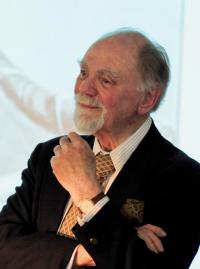One of the most distinguished historians ever to join our ranks, Peter Paret, died in 2020 at age 96. His tenure here was

from 1962 to 1966. He was my pre-predecessor in the German history field, and built up our library's collection very impressively. He moved on to Stanford, where he taught for some twenty years, until joining in 1986 the faculty of the Institute for Advanced Study in Princeton NJ. He sponsored my stay at the Institute in 1990-91, where I heard him say -- and Wikipedia repeats this -- that his years at Davis were the happiest of his life. He recalled regular coffee breaks on campus with our departed colleagues Bill Smith, Bick O'Brian, Jim Shideler and others. He had a custom house, in modern glass-and-wood style, built here for himself and his young family. His wife Isabel [d. 2018] was a psychoanalyst. Peter himself was the son of a German-Jewish mother, involved herself in the Freudian movement.
Peter was a major military historian of global reputation, but he also published influential works in the field of art history.
Here is Wikipedia on his early career, including his appointment at Davis. :
In 1962, Paret came to the University of California, Davis, as Visiting Assistant Professor. He was promoted to tenure the following year, and to full professor in 1966.[1] During these years at an innovative, rapidly expanding campus, which he later characterized as the happiest in his academic career, he published a study of the modern French theory of political-military warfare, French Revolutionary Warfare from Indochina to Algeria (New York, 1966), and an expanded version of his dissertation, Yorck and the Era of Prussian Reform (Princeton, 1966), a work combining ideological analysis with the study of operational and tactical doctrine, and prepared the context for his growing interest in the ideas and life of Clausewitz, who as a young officer was an active member of the Prussian reform movement.
Peter -- stamped by his own soldiering in World War II --went on to become the authoritative historian of the great theoretician of war, Carl von Clausewitz. On his vast scholarly work, see the his obituary from the IAS (click here) and Wikipedia entry (click here).
He was a man of aristocratic bearing, piercing judgment, but unself-important and inclined to gentle self-deprecating wit. He possessed a rare understanding of how his life experience had made him the person he was. He was so cosmopolitan he could pass as well as a German or Englishman as an American. At Princeton, he lived in a house Robert Oppenheimer had built, but he filled in the swimming pool to make a beautiful garden. He had inherited museum-worthy works of art, including an oil painting of his mother by the great German impressionist Lovis Corinth. Descended on his father's side from a long line of Protestant pastors, originally Huguenot refugees in 18th-century Prussia, he was related on his mother's side to the culturally influential German-Jewish Cassirer family, his great uncle being the humanist philosopher Ernst Cassirer. His presence here honors UC Davis's history.
Tribute by:
Prof. Emeritus Bill Hagen